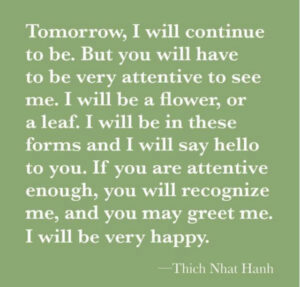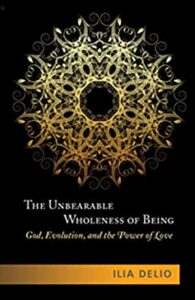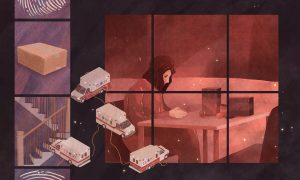Interdependence
Friday, February 18th, 2022
February 18, 2022From the Flourish Foundation:
‘With this shift in feeling, we soften the illusory crust of independence and begin to sense a natural belonging with all of life—interdependence. From this place of infinite belonging a deeper sense of care awakens and inspires us to consider our role in the co-creation of reality. More simply, we may choose clothes that support humane working conditions, foods that replenish the planet, a circular economy, and love toward those of a different race, country, or political party.’
“Only the grace of Spirit can enable us to let go of our fears. True prayer (spiritual dialogue) is fundamental for life in Spirit. It is that grace of conversion that opens up our hearts to realize the humble presence in our lives. Prayer of the heart is unceasing prayer, where Spirit breathes in us and our hearts are turned. This deepening of our lives in the divine life is the path to self-discovery. In and through prayer we discover our true selves, the self that Spirit has created each of us to be. . . .
Life in <Divine Presence> should be a daring adventure of love but often we settle for mediocrity. We follow the daily practice of prayer but we are unwilling or, for various reasons, unable to give ourselves totally…to settle on the plain of mediocrity is to settle for something les…”
-Franciscan theologian Ilia Delio
‘Prayer Is Not Enough.’
April 15, 2020The Dalai Lama on Why We Need to Fight Coronavirus With Compassion
This crisis shows that we must all take responsibility where we can. We must combine the courage doctors and nurses are showing with empirical science to begin to turn this situation around and protect our future from more such threats.
In this time of great fear, it is important that we think of the long-term challenges—and possibilities—of the entire globe. Photographs of our world from space clearly show that there are no real boundaries on our blue planet. Therefore, all of us must take care of it and work to prevent climate change and other destructive forces. This pandemic serves as a warning that only by coming together with a coordinated, global response will we meet the unprecedented magnitude of the challenges we face.
As human beings, we have the capacity to use our minds to conquer anger and panic and greed. In recent years I have been stressing “emotional disarmament”: to try to see things realistically and clearly, without the confusion of fear or rage. If a problem has a solution, we must work to find it; if it does not, we need not waste time thinking about it.
We Buddhists believe that the entire world is interdependent. That is why I often speak about universal responsibility. The outbreak of this terrible coronavirus has shown that what happens to one person can soon affect every other being. But it also reminds us that a compassionate or constructive act—whether working in hospitals or just observing social distancing—has the potential to help many.
[Text In Full]
‘Prayer Is Not Enough.’
‘Sometimes friends ask me to help with some problem in the world, using some “magical powers.” I always tell them that the Dalai Lama has no magical powers. If I did, I would not feel pain in my legs or a sore throat. We are all the same as human beings, and we experience the same fears, the same hopes, the same uncertainties.
From the Buddhist perspective, every sentient being is acquainted with suffering and the truths of sickness, old age and death. But as human beings, we have the capacity to use our minds to conquer anger and panic and greed. In recent years I have been stressing “emotional disarmament”: to try to see things realistically and clearly, without the confusion of fear or rage. If a problem has a solution, we must work to find it; if it does not, we need not waste time thinking about it.
We Buddhists believe that the entire world is interdependent. That is why I often speak about universal responsibility. The outbreak of this terrible coronavirus has shown that what happens to one person can soon affect every other being. But it also reminds us that a compassionate or constructive act—whether working in hospitals or just observing social distancing—has the potential to help many.
Ever since news emerged about the coronavirus in Wuhan, I have been praying for my brothers and sisters in China and everywhere else. Now we can see that nobody is immune to this virus. We are all worried about loved ones and the future, of both the global economy and our own individual homes. But prayer is not enough.
This crisis shows that we must all take responsibility where we can. We must combine the courage doctors and nurses are showing with empirical science to begin to turn this situation around and protect our future from more such threats.
In this time of great fear, it is important that we think of the long-term challenges—and possibilities—of the entire globe. Photographs of our world from space clearly show that there are no real boundaries on our blue planet. Therefore, all of us must take care of it and work to prevent climate change and other destructive forces. This pandemic serves as a warning that only by coming together with a coordinated, global response will we meet the unprecedented magnitude of the challenges we face.
We must also remember that nobody is free of suffering, and extend our hands to others who lack homes, resources or family to protect them. This crisis shows us that we are not separate from one another—even when we are living apart. Therefore, we all have a responsibility to exercise compassion and help.
As a Buddhist, I believe in the principle of impermanence. Eventually, this virus will pass, as I have seen wars and other terrible threats pass in my lifetime, and we will have the opportunity to rebuild our global community as we have done many times before. I sincerely hope that everyone can stay safe and stay calm. At this time of uncertainty, it is important that we do not lose hope and confidence in the constructive efforts so many are making.’
#
Hala Alyan.
April 2, 2020EMERGENCE MAGAZINE
‘Can we make room for grief, empathy, and hope?
We are all suddenly sleeper cells. Nobody is impervious. Nobody can buy their way out of it. (Though certainly those without resources will suffer more.) We are all in an elaborate, complicated ballet with everyone else, and the only thing more astonishing than this new reality is that it isn’t new at all. Only our awareness of it is.
want to talk to my great-grandparents, to the generations who lived through genocide and immigration. Never before have I been more acutely aware of the role of elders, a population that capitalism—and, by extension, our culture—tends to overlook and undervalue. Nowhere does our history exist more vibrantly than in those who lived it. I want to line up my ancestors. I want to know how they survived.
Pull a thread here and you’ll find it’s attached to the rest of the world.
Empathy is a powerful potion, not for the faint of heart. Empathy requires opening yourself to suffering. I wonder what muscles of empathy will be built through this experience—towards those who struggle with their health, those who are imprisoned, those who get detained fleeing calamity. Those living under occupation.
The pandemic isn’t necessarily creating fears for people. It’s instead serving as a flashlight—illuminating people’s unsteadiest, half-finished parts. It’s showing us where our work remains.’



